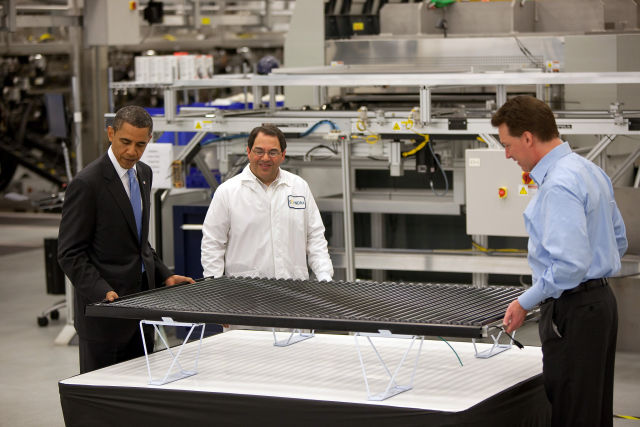
In a few short years, Solyndra went from a promising US-based manufacturer of high-tech solar panels to a bankrupt political football. The company received substantial loans from the Department of Energy during the financial stimulus that followed Obama's election. But shortly afterwards, the company went bankrupt amidst allegations that political pressure had played a role in ensuring that it received these loans.
Now, the DOE's inspector general has weighed in with a report describing its investigation into Solyndra's loans. The report suggests that, while political pressure may have made matters worse, lies by the company's executives were central to the loan failures.
The DOE's loan guarantees program is meant to foster riskier domestic energy programs (such as nuclear power plants) that would have difficulty securing financing otherwise. While they're expected to fail on occasion, the DOE is expected to do due diligence and put its money toward viable companies.
During the stimulus, however, the DOE received a large influx of money without a corresponding influx of staff, making it more difficult for programs like this to be fully evaluated. In addition, the loans were made in the midst of a severe recession, when many businesses faced substantial risks. So, it's no surprise that some of the loans failed; in Solyndra's case, the situation was made worse by a boom in photovoltaic manufacturing in China, which flooded international markets with cheap hardware.
In Solyndra's case, however, several of the company's investors had close ties to the Obama administration, and accusations were made that there was improper pressure to approve the loan. At the same time, allegations were made that the company's executives weren't fully truthful in the documents they filed with the DOE; several prosecutors started investigations, but no charges were ever made.
The DOE inspector general's report suggests that all of these were probably contributing factors to the approval of the failed loans. Rather than being specific to Solyndra, it suggests that the political pressure was more general: administration officials wanted to see loans approved more quickly in order to be able to announce that the stimulus was progressing.
That pressure may have contributed to a key failure on the part of DOE staffers. Among the mounds of documents filed with the DOE by Solyndra, two (one a spreadsheet) indicated that business wasn't doing as well as the other filings suggested. Specifically, its customers weren't buying as much hardware as claimed, and several of them were getting discounts on the prices. If the staff weren't feeling rushed to move forward, these warning signs might have been caught.
But most of the blame falls on the company itself—DOE officials shouldn't have had to read documents that carefully to spot discrepancies, as there shouldn't have been discrepancies. "Solyndra provided the Department with statements, assertions, and certifications that were inaccurate and misleading, misrepresented known facts," the inspector general concludes, "and, in some instances, omitted information that was highly relevant to key decisions in the process to award and execute the $535 million loan guarantee."
The issues in particular seemed to be that the DOE was not informed of the discounts that some customers were getting, nor that Solyndra had agreed to let some customers cut back on orders they had already contracted for.
As investigations into possible prosecutions have wound up and political outrage has largely moved on to other topics, this may finally allow Solyndra to fade from the news.
The report is available via the DOE website.
reader comments
116